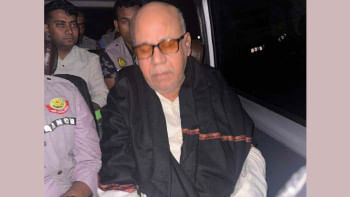Passion for Bengali, admiration for a father!

Publisher: Kathaprokash, Pages: 95, Price: Tk150, Available at the Ekushey Book Fair
Acollection of essays where a son recollects the impact of his father on his life, thought, ideology and vision in life – Megh o Babar Kichu Kotha may appear to be just that at a cursory look. In fact, this is far more than a few essays written by a son trying to come to terms with the approaching end of his terminally ill father, who, happens to be a renowned writer.
I would say that despite the major themes being death and the preparation of a man in accepting the life sapping illness of a closed one, there is a potent undercurrent of patriotism – love for one's country, language and culture.
Curiously, it's the constant allusion to the grim end which only reinforces the writer's resolve to adore his country more, and strive to write in his mother tongue.
These two opposite forces, one of death and the other of defying death by carrying on the literary crusade launched by his poet, writer father, permeate the whole book.
Ditio is the son of late Syed Shamsul Haque, and yes, the name of the father will come up from time to time when Ditio's works or his writings are critiqued.
That cannot be helped and here, in his first book in Bengali, released at the ongoing Ekushey Boi Mela, Ditio writes how the recognition of his father's illness made him take a pivotal decision in life.
Staying in the UK, faced with the prospect of losing his dad in a short while, Ditio decided to leave a life of routine in the West and come back home to pick up the pen and write.
And, write in Bangla!
At the intro, he admits to brushing up on his language by picking up the 'abidhan' or dictionary, and then, debunking the oft held erroneous belief: to appear cosmopolitan, one should not appear to be adept in one's own mother tongue.
Ditio hits right at the heart of a rising social anomaly, where speaking Bangla with a stilted western accent is deemed smart.
Ami Banglae bhalona (my Bengali is weak) - a line used to create an aura of pseudo social sophistication is something the writer, having spent more than 30 years in the UK, finds hard to approve and digest.
While writing in Bengali fluidly he goes back to the precious moments he spent with his father, learning about our history and the unparalleled beauty of rural Bangladesh. Kurigram and its tranquility come up regularly and so do the vivid memories of a boy – the elections in Bangladesh, countless electoral symbols, the simple aspirations of the people and, of course, the inexorable presence of romanticism which is quintessentially Bengali in flavour.
Here, reference to love is slow paced, the prelude is languorous, enriched by poetry, butterflies during twilight and topped by spellbinding rural fantasy.
There are two ways of looking at this collection of essays that narrate a son basking in the pleasure of writing and looking after a dying father – one which is somber and sad, the other, filled with the tenacity to reinvent oneself.
Death often triggers a new awakening and the leitmotif is the rediscovery of a London based IT Specialist.
Just like Ditio, who took the landmark decision to come back to Bangladesh to write, long ago, his grand- father, a doctor by profession in Calcutta, faced the same question: "what am I doing here!" Which, eventually drove him to do some soul searching and come to Bangladesh and settle here to serve the rural people.
While all throughout the work we move closer and closer to the end of a life, there is also an unmistakable force of re-birth.
Ditio writes poignantly about a son and father bond and of the feeling of emptiness when someone places a close relative in a grave.
Yet, I take away the positive spirit of the work – the impact of a man leaving us, triggering a new understanding in another.
In the end, we are not plunged into a sepulchral mood, but refreshed with the scene of countless golden grass-hoppers, which seem to have appeared to wipe away the grimness of burial.
An end here but perhaps a start somewhere else - Ditio leaves us to interpret death as we want to.
As for the writer who has decided to stay in Bangladesh and carry on with the pen, death opened a door, a path to literary adventure.
Ditio Syed Haq writes well, and surely his journey in this new role will be more rewarding. A must read for those who crave literary profundity, not frivolity.
The reviewer is an occasional contributor.


 For all latest news, follow The Daily Star's Google News channel.
For all latest news, follow The Daily Star's Google News channel. 



Comments